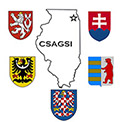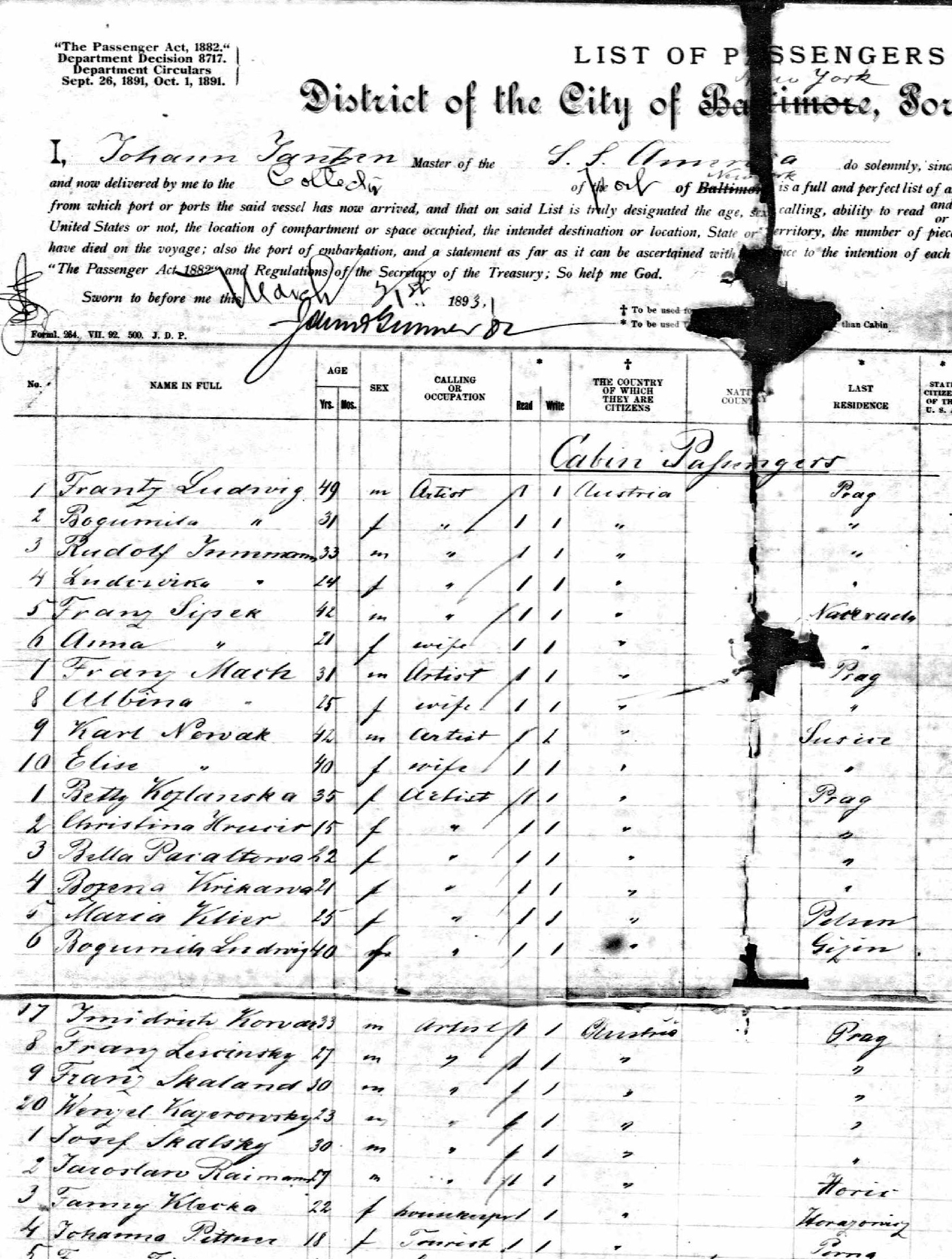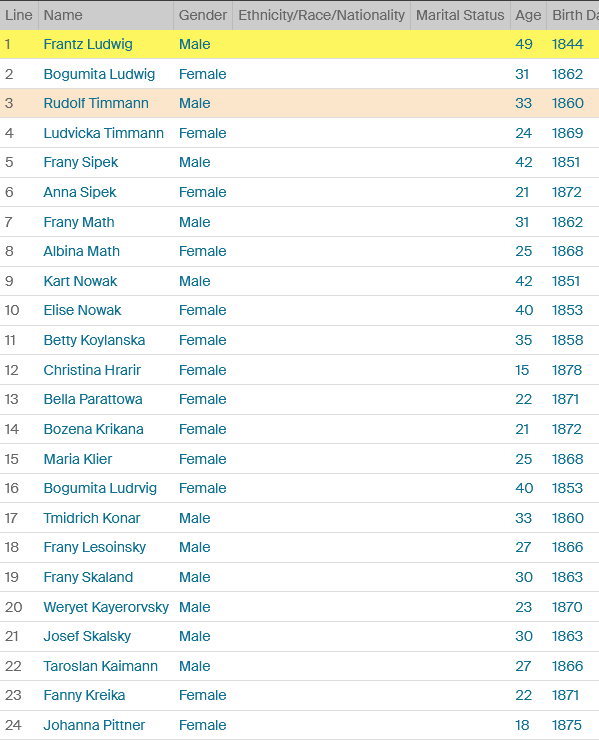Ludvik Theater
(Ludvikovo Divadlo)
Departing Bremen and arriving at New York City on March 21, 1893 aboard the ship America were 24 passengers, many of whom would become participants in the Ludvik Theater. They were led by the director, Frantisek Ludvig, who was accompanied by his wife (who would play many leading roles) Bohumila. Most of those arriving would eventually stay in the United States to form the "Ludvikovo Divadlo", the Ludvik Theater which would have most of its performances in the Thalia Theatre in Chicago.
Soon after their arrival, the group first held performances in New York City. They then traveled across many states, mostly with large Czech populations, staging their plays in towns large and small.
The University of Nebraska at Lincoln has a paper, arranged by Vladimir Kucera, which provides a very good summary of the Ludvik performers as they traveled the USA. ( https://www.unl.edu/czechheritage/Vladimir%20Kucera%20Writings/CzDramaOPRAVENO.pdf)
Czech Drama in Nebraska - Ceska Divadla v Nebrasce
LUDVIK THEATRE COMPANY By Alfred Novacek
Frantisek Ludvik, the founder of the most famous theatre companies in the Old Country, was born March 3rd 1843. in Prague, Bohemia. In 1893 a few prominent Czech Americans invited and sponsored the Ludvik Theatre Company to tour the United States. On March 8, 1893, a theatre group of 20 left Bremen, Germany, on the ship “America” arriving in America on March 20 where they were greeted by their Czech American friends. Their first play was in New York City in Central Opera House to an overflow crowd. From there they toured Baltimore, Pittsburgh, Cleveland, Detroit, Chicago, Milwaukee, Green Bay, Kewanee, Manitowoc, Racine, St. Paul, 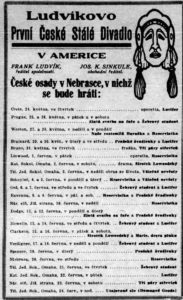 Minneapolis, Cedar Rapids and Iowa City, finally reaching Nebraska on October 9 at Omaha. From Omaha, they performed at Plattsmouth on October 15, then to Dodge, Schuyler, Linwood, Prague, Wahoo, Crete, Wilber, Milligan, then back to Wilber, then on to Humboldt, then back to Omaha and then reaching New York on January 21, 1894. According to excerpts taken from a book written in 1918, Pamatnik Ludvikovy divadelni spolecnosti about the travels of the Ludvik Theatre Company in America, they were very well received in Czech Nebraska. (Image Left - Omaha Nebraska Newspaper Kvety Americke 5-23-1917) LudvikovaMany towns and the town people greetedthem at the railroad stations with bands and then a parade to the hall where a banquet was held. It was said that the town of Wilber really made them feel at home, because practically the entire town and countryside was settled by Czechs and they really poured out their love for their countrymen. Another example was the village of Linwood where a band greeted them at the station and then marched to a hall where they were treated royally with a meal and all the trimmings. A Band was also on hand to see them off as they departed to Prague, Nebraska. When the group was about to depart back to Europe, approximately twelve of the actors and Mr. Ludvik decided to stay and make America their home and settled in Chicago where they founded the Ludvik Theatre Company presenting plays each Sunday to the Czech Americans in the Chicago area. To celebrate the Silver Jubilee of the
Minneapolis, Cedar Rapids and Iowa City, finally reaching Nebraska on October 9 at Omaha. From Omaha, they performed at Plattsmouth on October 15, then to Dodge, Schuyler, Linwood, Prague, Wahoo, Crete, Wilber, Milligan, then back to Wilber, then on to Humboldt, then back to Omaha and then reaching New York on January 21, 1894. According to excerpts taken from a book written in 1918, Pamatnik Ludvikovy divadelni spolecnosti about the travels of the Ludvik Theatre Company in America, they were very well received in Czech Nebraska. (Image Left - Omaha Nebraska Newspaper Kvety Americke 5-23-1917) LudvikovaMany towns and the town people greetedthem at the railroad stations with bands and then a parade to the hall where a banquet was held. It was said that the town of Wilber really made them feel at home, because practically the entire town and countryside was settled by Czechs and they really poured out their love for their countrymen. Another example was the village of Linwood where a band greeted them at the station and then marched to a hall where they were treated royally with a meal and all the trimmings. A Band was also on hand to see them off as they departed to Prague, Nebraska. When the group was about to depart back to Europe, approximately twelve of the actors and Mr. Ludvik decided to stay and make America their home and settled in Chicago where they founded the Ludvik Theatre Company presenting plays each Sunday to the Czech Americans in the Chicago area. To celebrate the Silver Jubilee of the 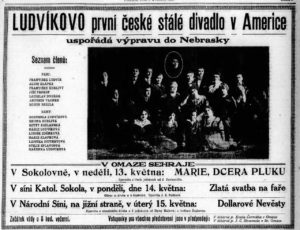 Ludvik Theatre Company in America, they decided to make another tour of America to play to Czech Americans. The troupe left La Salle Station in Chicago on May 11, 1917, and arrived in Omaha the next day. On May 13th, they played to a full house in Sokol Hall on 13th Street, following the next day at the Catholic Sokol Hall and then on to South Omaha. While they were in Omaha their headquarters was at the Prague Hotel. From South Omaha, they proceeded to Plattsmouth, then on to Humboldt, stopping in Lincoln to be greeted by Professor Melzer, Sarka Hrbek and a host of students from the University of Nebraska of Czech descent. From Humboldt to Milligan, Wilber, Crete, Prague, Weston, Brainard, Bruno, (Image Right - Ludvikovo Newspaper - Pokrok - Wislon, Kansas 5-9-1917) Linwood, back to Omaha, and then to Schuyler, Ord, Ravenna, back to Omaha, and then to Dodge, Howells, Clarkson, Verdigre, Spencer, Niobrara, then back to Brainard and then back to Omaha. By popular demand they returned to Prague, Crete, Wilber, Milligan and then one last stop in Omaha, before departing for Iowa on September 1st. All in all they played to over thirty five thousand people in approximately 40 different plays. As was stated from the excerpts, the trip and tour through Nebraska by the Ludvik Theatre Company was received very warmly by the Czech Nebraskans as each town hosted them in their own special way. It should be said that all the traveling was done by trains and each of the 20 actors was paid fifty dollars a week for the tour. During the season in Chicago, they gave plays every Sunday and were paid little or nothing. The above brief history was taken from a book Pamatnik Ludvikovy divadelni spolecnosti published in 1918 to commemorate the Silver Jubilee of the Company. The book was given to the author by Libuse Zdenek Prokop, one of the performers that made the tours and was a regular actor with the theatre company. Frantisek Ludvik, the founder of the permanent Czech theatre in America. He was born March 3, 1843 in Prague, Bohemia. He first started to perform on the stage in 1893. Frantisek Ludvik died October 24, 1910 in Chicago.
Ludvik Theatre Company in America, they decided to make another tour of America to play to Czech Americans. The troupe left La Salle Station in Chicago on May 11, 1917, and arrived in Omaha the next day. On May 13th, they played to a full house in Sokol Hall on 13th Street, following the next day at the Catholic Sokol Hall and then on to South Omaha. While they were in Omaha their headquarters was at the Prague Hotel. From South Omaha, they proceeded to Plattsmouth, then on to Humboldt, stopping in Lincoln to be greeted by Professor Melzer, Sarka Hrbek and a host of students from the University of Nebraska of Czech descent. From Humboldt to Milligan, Wilber, Crete, Prague, Weston, Brainard, Bruno, (Image Right - Ludvikovo Newspaper - Pokrok - Wislon, Kansas 5-9-1917) Linwood, back to Omaha, and then to Schuyler, Ord, Ravenna, back to Omaha, and then to Dodge, Howells, Clarkson, Verdigre, Spencer, Niobrara, then back to Brainard and then back to Omaha. By popular demand they returned to Prague, Crete, Wilber, Milligan and then one last stop in Omaha, before departing for Iowa on September 1st. All in all they played to over thirty five thousand people in approximately 40 different plays. As was stated from the excerpts, the trip and tour through Nebraska by the Ludvik Theatre Company was received very warmly by the Czech Nebraskans as each town hosted them in their own special way. It should be said that all the traveling was done by trains and each of the 20 actors was paid fifty dollars a week for the tour. During the season in Chicago, they gave plays every Sunday and were paid little or nothing. The above brief history was taken from a book Pamatnik Ludvikovy divadelni spolecnosti published in 1918 to commemorate the Silver Jubilee of the Company. The book was given to the author by Libuse Zdenek Prokop, one of the performers that made the tours and was a regular actor with the theatre company. Frantisek Ludvik, the founder of the permanent Czech theatre in America. He was born March 3, 1843 in Prague, Bohemia. He first started to perform on the stage in 1893. Frantisek Ludvik died October 24, 1910 in Chicago.
On November 24, 1907, the Chicago published an article to celebrate the fifteenth anniversary of the Bohemian Theater in Chicago.
"A theater preserving the traditions of the Bohemian stage and striving to be the educational and cultural institution of the people as well as amusement place exists in Chicago. It is the Bohemian opera house, named the "Thalia" and located at Eighteens street and Allport avenue, the heart of the Bohemian district in this city. In March, 1908, the little group of actors - sixteen in all - centered about the figure of Frank Ludvik, the director, will celebrate their fifteenth anniversary. The record upon which the little group look back at its anniversary is an interesting one.
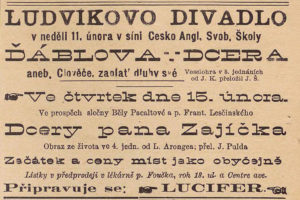 Fifteen years a ago a Bohemian play was given here by a traveling Borhmian troup which was then touring the United States. The performance proved a success. The constantly increasing number of Bohemians arriving in this city seemed to foretell that the metropolis of the west might some day prove another Prague to Bohemians, and several members of that troupe decided to remain and amuse as wall as instruct their countrymen. Frank Ludvik, the present director of the theater was one of that group.
Fifteen years a ago a Bohemian play was given here by a traveling Borhmian troup which was then touring the United States. The performance proved a success. The constantly increasing number of Bohemians arriving in this city seemed to foretell that the metropolis of the west might some day prove another Prague to Bohemians, and several members of that troupe decided to remain and amuse as wall as instruct their countrymen. Frank Ludvik, the present director of the theater was one of that group.
Since that time, by dint of hard work, energy and patience, the actors and actresses, encouraged by the appreciation of their work by the Bohemian people at large, have worked up the theater until today it is a permanent institution in the Bohemian community.
The plays at the Thalia are given only once a week - Sunday evenings. They are the best products of Bohemian as well as of classic writers in other languages. Shakepreare and Mollere are not strangers there. The modern writers, the vitally modern plays of men like Hauptmann and Sudermann in Germany and writers of similar standing in other countries are presented as soon as translations of them are made into Bohemian.
One of the striking characteristics about this Bohemian theater is the total absence of cheap performers and cheap performances. Most of the actors at the Thalia theater have grown up with that institution. They are all immigrants and graduates of higher institutions of learning in their native country.
In the case of Mrs. Bohumila Ludvik, wife of the director, and Miss Ludvik, his daughter, the spectators frequently behold mother and daughter attempt to "act" on the stage that which they are in real life mother and daughter. But Mrs. Ludvik is not only an actress but a translator and frequently editor of plays. Where a play which is really great has not found its way into Bohemian, mrs. Ludvik at once translates that play herself in order to be not only up to date, but even ahead of date of the theaters in Golden Prague."
On May 31, 1908, the Chicago Tribune published a full page article describing that they felt "Chicago Has More Foreign Language Theaters Than Any Other Cit In the World". The paper felt that the Bohemian Theater was the best.
Bohemian Oldest of Chicago Foreign Theaters
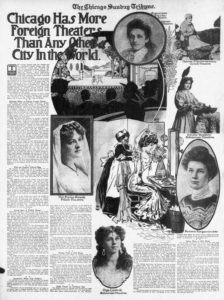 The oldest and perhaps most influential though least ostentatious foreign theater in Chicago is the Bohemian playhouse located in Thalia hall, eighteenth and Allport streets. This theater was founded in 1893 by Frantisek Ludvik, a Bohemian actor who, after many years of experience as a director of theaters in Prague, came to America in 1892. Mr. Ludvik is still director of the theater. For a year he played in some of the largest cities of the country where there was a strong Bohemian population.
The oldest and perhaps most influential though least ostentatious foreign theater in Chicago is the Bohemian playhouse located in Thalia hall, eighteenth and Allport streets. This theater was founded in 1893 by Frantisek Ludvik, a Bohemian actor who, after many years of experience as a director of theaters in Prague, came to America in 1892. Mr. Ludvik is still director of the theater. For a year he played in some of the largest cities of the country where there was a strong Bohemian population.
Upon his arrival in Chicago he became convinced that the western metropolis is destined to be the Prague of America. And, as he had been attracted by American life and American institutions in general, Mr. Ludvik persuaded his troupe to settle down here and start a little theater. Thalia hall then was rented and since that time it has served as a playhouse. 
"The Bohemian Theater," said Mr. Ludvik, "has had hard times. But it has overcome all obstacles until today we find that we need more room and we may have to move into a larger building. The theater always has been a part of our culture an education and it is to this that we attribute our successful maintenance of a theater in the Bohemian language in Chicago for the last fifteen years.
Today there no longer is any doubt that the theater is a permanent institution in the Bohemian community. We have a more than liberal patronage. The actors and management strive to give the public the best and latest productions. To keep abreast of the times has always been our aim. We have been successful in this because of the high standing of our actors. All of them are men of a higher education. They know several languages and so we are able to present nearly every production of importance as soon as it comes out. We have played Hauptmann and Sudermann. In fact, we have presented many plays of consequence in our theater ahead of other playhouses in America"
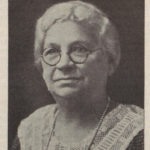 Mr. Ludvik is assisted in his work largely by his wife, Bohumila Ludvik, who is an excellent actress herself, as well as a skillful translator of plays and manager of the stage. His daughter, Olga Ludvik, though born in America, likewise is taking important roles in nearly every play presented at the Thalia theater.
Mr. Ludvik is assisted in his work largely by his wife, Bohumila Ludvik, who is an excellent actress herself, as well as a skillful translator of plays and manager of the stage. His daughter, Olga Ludvik, though born in America, likewise is taking important roles in nearly every play presented at the Thalia theater.
"The influence which this theater has had upon the Bohemian people of Chicago," Mr. Ludvik continued, "certainly was beneficial. We never gave any cheap show; never cared for variety performances. No money considerations could induce us to debase the theater to an institution of purely commercial nature. We have given historical plays, cultural plays, plays in which the democratic element dominated. In other words, we have always given plays which furnished some brain food to the people who attend the theater.
"As far as it lay within our power, we sought to adhere to the original aim and object of a theater, which is that of educating and uplifting the people, of instructing while amusing. This does not mean that we fed our patrons on exclusively serious plays. We present comedies, too. Ludwig Fulda is not a stranger on our stage. But comedies of this sort are as educative as they are amusing."
One of the best summaries describing this group of actors and actresses, and the establishment of Ludvik Theater is provided by the Commission on Chicago Landmarks, as the city was considering giving the Pilsen neighborhood landmark status.
1215-25 WEST 18TH STREET - CHICAGO, ILLINOIS
PRELIMINARY STAFF SUMMARY OF INFORMATION SUBMITTED TO THE COMMISSION ON CHICAGO LANDMARKS
OCTOBER, 1988
The building permit for Thalia Hall was issued on April 25, 1892. Construction con- tinued throughout that year, leading to its completion by the end of April the next year when the Ludvik Dramatic Players gave their first performance in the Thalia Hall theater. Frantisek Ludvik was born in Prague, Bohemia, on March 3, 1843. Trained in the National Theater of Prague, he worked as a professional actor in Bohemia until founding his own company, the Ludvik Dramatic Players, in the late 1870s. In 1892, Ludvik began soliciting Bohemian-American financial support for a tour of the United States by his company. There was no professional Czech language theater in the U.S. at the time, and he sought to tour the Bohemian communities and perform in Chicago as a complement to the World's Columbian Exposition to be held the next year. Led by a group of Chicagoans, a committee was formed to provide financial assistance for Ludvik's venture.
On March 8, 1893, the Ludvik Players departed Bremen, Germany on the steamer "America," arriving in New York on the 20th. With the director and his wife, the company included twelve men and ten women. The group was met at the dock by members of the New York Bohemian community who provided housing to them for the duration of their stay in New York. Their first performance, and the first professional dramatic presentation in the Czech language in the United States, was Gazdina Roba (Gazda's Robe) by Gabriela Preis, given at the New York Central Opera House on March 26. After a twelve-day run, they continued their tour with stops in Baltimore, Pittsburgh, Cleveland, and Detroit before reaching Chicago at the end of April. In Chicago they played at the old Haymarket Theater in the Loop and, as a gesture of thanks to the community that was largely responsible for making their trip possible, in Pilsen at the Czech Slavik Benevolent Aid Society hall and at Thalia Hall. After four weeks in Chicago, Ludvik's troupe continued its tour, playing the Bijou Opera House in Milwaukee, the Minneapolis Opera, and at venues in Cedar Rapids, Iowa, and in Omaha and Lincoln, Nebraska.
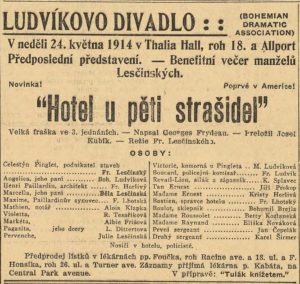 They returned to Chicago in August with the apparent intent to make a final series of presentations before returning to Prague. On their arrrival they were met by Ludvik's friends Joseph Smaha, the director of the National Theater of Prague, and Joseph H. Capek, a musician and composer. Under Smaha's leadership as guest director, and with Capek directing an orchestra of local musicians, the Ludvik Players performed the popular Bohemian opera Prodana Nevesta (The Bartered Bride) by Bedrick Smetana at the Haymarket Theater on August 20, 1893. Among the first operas written in the Czech language, it had been performed previously only in German translation in the United States. Considered to be an important work and well known for its patriotic themes, it had earned for its composer the popular title "the Beethoven of Bohemia."
They returned to Chicago in August with the apparent intent to make a final series of presentations before returning to Prague. On their arrrival they were met by Ludvik's friends Joseph Smaha, the director of the National Theater of Prague, and Joseph H. Capek, a musician and composer. Under Smaha's leadership as guest director, and with Capek directing an orchestra of local musicians, the Ludvik Players performed the popular Bohemian opera Prodana Nevesta (The Bartered Bride) by Bedrick Smetana at the Haymarket Theater on August 20, 1893. Among the first operas written in the Czech language, it had been performed previously only in German translation in the United States. Considered to be an important work and well known for its patriotic themes, it had earned for its composer the popular title "the Beethoven of Bohemia."
The critical and financial response to the several performances of Prodana Nevesta convinced Ludvik to stay in the U. S. and make Chicago his base of operations. Four members of the touring company returned to Prague that fall with Smaha; eighteen of the players, joined by musical director Capek, remained in Chicago. Taking the name Ludvik 's Bohemian Dramatic Society of Chicago (Ludvikovo Divadlo Chicaga), they made Thalia Hall theater their home stage with the beginning of the winter season. Although the Ludvik Dramatic Society shared the Thalia stage with local amateur productions, traveling vaudeville acts, and eventually cinematic presentations, the hall became known unofficially as the Hall of the Ludvik Players (Sidlo Ludvikovcu).
The Ludvik Dramatic Society performed traditional Bohemian dramas and operettas, and classics from a number of countries in Czech translation, including works by William Shakespeare, Moliere, Oscar Wilde, Georges Bizet, and Giacomo Puccini. Of equal importance to the residents of Pilsen, however, were the newly written works produced by the members of the company. Most of these used themes based on the Bohemian perspective of life in the United States, and some used events in American history as their dramatic settings. It was this original material that formed the greatest body of work performed by the company when they returned to Bohemia for a three-month tour in 1898. Among the plays given critical acclaim in Prague were such titles as V srdci Chicaga (Heart of Chicago), Sever proti Jihu (North versus South), and Bordynkari (The Tenants).
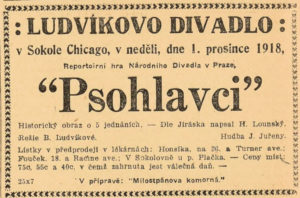 The Ludvik Dramatic Society continued to perform and produce new work at Thalia Hall until 1920. After Frantisek Ludvik died on October 24, 1910, his wife, Bohumila, and son, Frantisek Jr., continued the company, and in March, 1918, they celebrated the twenty-fifth anniversary of their arrival in the U.S. with a gala at Thalia Hall. Three ofthe original cast members on the 1893 tour were still with the company, a number of their children had joined, and former members returned for the celebration. The success of professional theater in the Bohemian community was considered an anomaly since larger ethnic communities in Chicago, in particular the Germans, whose population was more than three times that of the Bohemians, had failed to sustain similar efforts.
The Ludvik Dramatic Society continued to perform and produce new work at Thalia Hall until 1920. After Frantisek Ludvik died on October 24, 1910, his wife, Bohumila, and son, Frantisek Jr., continued the company, and in March, 1918, they celebrated the twenty-fifth anniversary of their arrival in the U.S. with a gala at Thalia Hall. Three ofthe original cast members on the 1893 tour were still with the company, a number of their children had joined, and former members returned for the celebration. The success of professional theater in the Bohemian community was considered an anomaly since larger ethnic communities in Chicago, in particular the Germans, whose population was more than three times that of the Bohemians, had failed to sustain similar efforts.
